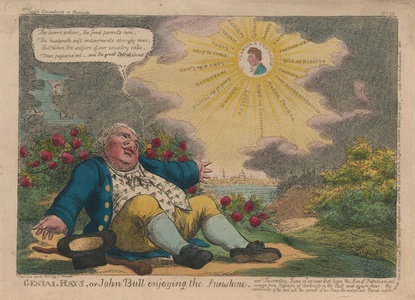| Method | Etching with original hand colouring |
| Artist | Charles Williams |
| Published | Pub.d June 1810 by Thos. Tegg 111 Cheapside. |
| Dimensions | Image 225 x 325 mm, Plate 254 x 350 mm, Sheet 274 x 400 mm |
| Notes |
Public reaction to Burdett's arrest and subsequent release satirised by Charles Williams. In the foreground, the portly form of John Bull, representing the British citizenry, sits in an idyllic summer countryside, basking in the rays of the sun, whose face bears a profile of the people's champion Francis Burdett, 5th Baronet. John Bull, wearing coat, breeches, waistcoat, necktie, and wig, turns his face upwards with a rapturous serenity, his stick and hat resting beside him. Rose bushes flower behind, and in the background, across the Thames, is the skyline of the City of London, with the dome of St Paul's prominent in the centre. Bull praises Burdett as the 'great Patriot,' in verse declaring: 'The Lover's ardour, the fond parent's care, / The husband's soft endearments strongly move; / But when the welfare of our country calls, / These passions set—and the great Patriot shines.' Burdett himself is surrounded with a latin inscription which reads 'Clarior e Tenebris' - 'Light from the Darkness' - a fitting description for the sun, but also potentially an archaic reference to Burdett's political unorthodoxy, as the same motto was often featured on Jacobite tokens of the Old Pretender. Burdett's 'rays' represent the various virtues and rights enjoyed by John Bull, and thus the citizenry, reading: Magna Charta, King and Constitution, Loyalty, Reform, Good of the People, Integrity, Laws of the Land, Trial by Jury, Lords, Habeas Corpus, Liberty, Candour, Justice, Truth, Freedom of the Press, Bill of Rights, Commons, and Free Representation. Below the image, following the title, is an inscription that reads like a mock horoscope: 'On Thursday June 21st or near that time the Sun of Patriotism will emerge from Reginon of darkness in the East and again cheer, the inhabitants of the west with the warmth of his Rays, the malignant Planets will for some time at least lose their balefull influence under the cloud which Ought to obscure them for ever,—vide Political Almanack. 1810.' The date to which John Bull turns his face in anticipation is the summer recess of Parliament, at which time, Burdett was to be released. In the year before this caricature, Burdett, the leading radical reformer of the era, had, alongside Gwyllym Wardle, led the attack on Frederick, Duke of York for the latter's supposed collusion with his mistress Mary Anne Clarke in selling military commissions. When fellow radical agitator John Gales Jones was confined to the Tower by the Commons, Burdett argued against the House's power to do so, leaving him open to a charge of libel. Burdett barricaded himself inside his house for two days, further increasing his reputation amongst the citizenry, who saw this as the very demonstration of the old adage that a man's house is his castle. Anticipating the potential for political violence, Burdett ended his resistance and was confined to the Tower until the recess. Charles Williams (active 1796-1830) was a British printmaker. In particular, he was a prolific etcher of satires to his own or others' designs. Almost all of his plates are unsigned. In later years he worked for different publishers simultaneously, including Fores, E. Walker, members of the Knight family, and Tegg (from 1807). Thomas Tegg (1776-1845) was a British bookseller, printseller, and publisher, trading most notably from a printworks and shop in Cheapside. His best remembered series are Tegg's Carricatures, the Caricature Magazine, the London Encyclopaedia, and the immensely popular Whole Life of Nelson. BM Satires 11563 Condition: Some tears to right hand margin. Repaired tears to top sheet edge and top left corner. Some toning and surface dirt to sheet. |
| Framing | unmounted |
| Price | £225.00 |
| Stock ID | 52988 |

